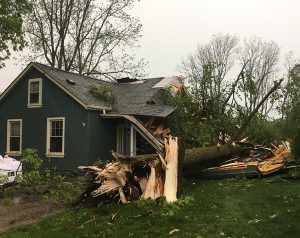
About midday on Sunday, nearly 24 hours after the storm that hit south-central Ontario, a cluster of people came walking down Balsam Street North toward us. My wife and I were piling a wall of tree debris in front of our home. We must’ve looked like zombies dragging branches and brush to and fro. We suddenly realized the cluster of people was our three grandsons, our daughter and son-in-law from a few blocks away in Uxbridge. My grandson ran up and embraced me.
“Just wanted to hug you,” he said.
“Me too,” I said and for the first time in hours I felt human again.
A day into the aftermath of the windstorm, we’d had lots of conversations with our neighbours: experiencing the storm, if anybody got hurt, severity of the damage and when we might get power back. Around us lay the twisted wreckage of much of Uxbridge’s celebrated greenbelt crown – snapped off spruces and pines, uprooted poplars, maples and birches – much of it three-quarters of a century old.
Not a single mature tree up our street had escaped the wind burst – someone said meteorologists verified it was a F-2 (Fujita Scale) tornado. But up until my grandson squeezed me, we’d all talked about the storm like some inanimate thing.
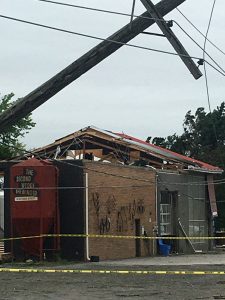
Then I heard Robert Gerrard on our battery-powered radio describe his experience from upstairs at his Second Wedge Brewing Company. “I heard the wind outside. “I’ve never heard anything like that,” he told CBC Radio. Then, he said he opened the door to see the roof gone and his outdoor beer garden torn to pieces. “It’s the most shocking thing I’ve experienced. I’m feeling really muddled.”
I realized he’d captured a lot of what we all felt in our part of town – some physical shock, remorse at lost property and the realization how close we’d come something worse.
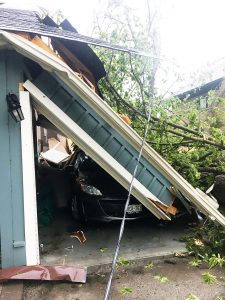
The amber alert sounded on my phone about 1 o’clock Saturday as I drove home from errands. Looking to the darkening horizon to the west, I took the alarm seriously. Minutes later, when I pulled into our driveway, I did something I never do except in winter; I drove my car into the garage.
The wind – yes, it sounded like an oncoming freight train – virtually pushed me through the front door of the house. I found our dog Jazz frantic with the noise, so grabbed him and ran for the basement. I took one last look outside and saw everything in our backyard – chairs, tables, plants, tools – suddenly levitate and literally fly away.
My mind flashed to Dorothy and Toto in the farmhouse hurtling to Oz. Rain then pounded the windows obscuring all but one thing. I saw the tallest, heaviest trees on our property come crashing through the garage where I’d just parked my car.
When I emerged from the basement and did like everybody else – shot stills for the insurance adjusters and some video for posterity – my wife and neighbours and I all began picking up pieces. As I say, we didn’t talk much except about “the stuff” that was broken or gone.
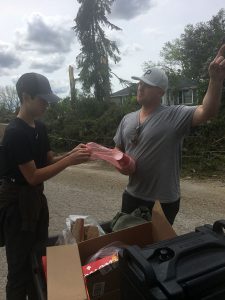
Then, a guy arrived from a few blocks away. Ken Freek had an armful of rubber tubs and tarps and a pleasant smile. “Don’t know what you might need,” he said, “but let us know if we can help.” All weekend long we received similar notes, emails (when intermittent service allowed) and visits from friends and strangers offering immediate help.
By holiday Monday, Andrew Rossi, who works mostly repairing water-damaged homes, had agreed to bring his crew to cut apart and extricate the two 80-year-old basswood trees that had crushed my garage and car.
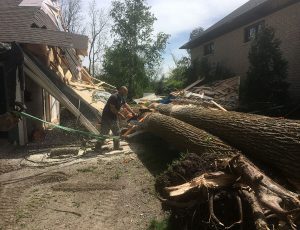
I’d seen him wielding a chainsaw, the night before, cutting up downed trees that had fallen in our neighbour’s yard. He wore safety gear, looked focused and strong, a latter-day Paul Bunyan. I asked if he’d help me extricate the basswoods from the garage. He came the next day.
“I’d estimate that the two (basswood) trees that hit your garage weighed about 10 tons,” he said when the job was done.

We talked about the newest word in our storm lexicon – derecho, a line of storms associated with fast-moving severe thunderstorms known as a mesoscale convective system. I never heard of the term before.
At one point, when Andrew Rossi and I both stopped to catch our breath on Monday, I asked where he was during the storm. He said he’d been on a date with his wife. He paused. His eyes welled up. He admitted how concerned he was for his loved ones and for those around him. He said the date ended and as soon as they arrived home, he grabbed his gear and started helping anybody who needed it.
“Moments like this make you realize what’s important,” he said. “Family…”